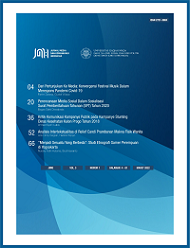Sikap Normalisasi Obesitas oleh Netizen dalam Gerakan Body Positivity di Media Sosial
Jasmin Jannatania(1*), Galuh Aulia Ramadhanti(2)
(1) Universitas Pamulang
(2) Universitas Pamulang
(*) Corresponding Author
Abstract
The body positivity movement which is rife on social media is currently increasingly worrying because of the emergence of the attitude of normalizing those who have overweight bodies to obesity. The purpose of this study was to find out the answers given by the influencers and netizen of the body positivity (bopo) movement when given a statement regarding the glorification of obesity. Virtual ethnographic methods are used in this study because of its reality in the form of social media. The findings of this research there are three results that are the attitude of the influencers and netizen of the bopo movement: (1) being positive, (2) the attitude of 'My Body My Rules', and (3) debate using research data. It was obtained that the influencers and netizen of this bopo movement continued to use these three things when debating about the body weighted more that had looked unhealthy anymore.
Keywords
Full Text:
PDFReferences
Afful, A. A., & Ricciardelli, R. (2015). Shaping the online fat acceptance movement: talking about body image and beauty standards. Journal of Gender Studies, 24(4), 453–472. https://doi.org/https://doi.org/10.1080/09589236.2015.1028523
Berger, P., & Luckmann, T. (2016). The social construction of reality. In In Social theory re-wired (pp. 110–122). Routledge.
Chervenic, B. (2015). Is Beauty Promise to Happines? The Undergraduate Journal of Amerixan Studies.
Cohen, R., Irwin, L., Newton-John, T., & Slater, A. (2019). #bodypositivity: A content analysis of body positive accounts on Instagram. Body Image, 29, 47–57. https://doi.org/https://doi.org/10.1016/j.bodyim.2019.02.007
Cwynar, J. (2016). Documenting Femininity: Body Positivity and Female Empowerment on Instagram. Journal of Chemical Information and Modeling, 53(9), 281.
Dharma, F. A. (2018). Konstruksi realitas sosial: Pemikiran Peter L. Berger tentang kenyataan sosial. Kanal: Jurnal Ilmu Komunikasi, 7(1), 1–9.
Fitria, K., & Febrianti, Y. (2020). the Interpretation and Attitude of Body Shaming Behavior on Social Media (a Digital Ethnography Study on Instagram). Diakom : Jurnal Media Dan Komunikasi, 3(1), 12–25. https://doi.org/10.17933/diakom.v3i1.78
Geofani, D. (2019). Pengaruh Cyberbullying Body Shaming Pada Media Sosial Instagram Terhadap Kepercayaan Diri Wanita Karir Di Pekanbaru. JOM FISIP, 6.
Hage, N. M. (2018). On Online Activism and the Probabilities of Social MediaThe Body Positivity Movement, Social Network Sites, and the Production of Discourse. July. http://dspace.library.uu.nl/handle/1874/368743%0Ahttp://localhost/handle/1874/368743
Hine, C. (2017). Ethnographies of online communities and social media: Modes, varieties, affordances. In The SAGE handbook of online research methods (2nd ed., pp. 401–415).
Homan, K. J., & Tylka, T. L. (2018). Development and exploration of the gratitude model of body appreciation in women. Body Image, 25, 14–22. https://doi.org/https://doi.org/10.1016/j.bodyim.2018.01.008
Kaur-Gill, S., & Dutta, M. J. (2017). Digital Ethnography: The International Encyclopedia of Communication Research Methods. https://doi.org/https://doi.org/DOI: 10.1002/9781118901731.iecrm0271
Lucibello, K. M., Sabiston, C. M., Pila, E., & Arbour-Nicitopoulos, K. (2023). An integrative model of weight stigma, body image, and physical activity in adolescents. Body Image, 45, 1–10.
Lupton, D. (2017). Digital media and body weight, shape, and size: An introduction and review. Fat Studies, 6(2), 119–134. https://doi.org/10.1080/21604851.2017.1243392
Martínez-Jiménez, L. (2023). Postfeminist neoliberalization of self-care: a critical discourse analysis of its representation in Vogue, Cosmopolitan and Elle. Feminist Media Studies, 23(6), 2814–2830.
Milatishofa, Kusrin, dan W. A. A. (2021). Analisis Resepsi Khalayak Terhadap Makna Body Positivity Pada Instagram Tara Basro. Linimasa : Jurnal Ilmu Komunikasi, 4(2), 174–185.
Morris, A. (2019). Fat activism and body positivity: freedom from dieting? In The Politics of Weight: Feminist Dichotomies of Power in Dieting (pp. 143–179). Cham: Springer International Publishing.
O’Hara, L., Ahmed, H., & Elashie, S. (2021). Evaluating the impact of a brief Health at Every Size®-informed health promotion activity on body positivity and internalized weight-based oppression. Body Image, 37, 225–237. https://doi.org/10.1016/j.bodyim.2021.02.006
Pearl, R. L., & Puhl, R. M. (2018). Weight bias internalization and health: a systematic review. Obesity Reviews, 19(8), 1141–1163. https://doi.org/10.1111/obr.12701
Pink, S., Horst, H. A., Postill, J., Lewis, T., & Tacchi, J. (2016). Digital Ethnography Principles and Practice. https://doi.org/https://doi.org/ 10.1017/CBO9781107415324.004
Salvatelli, R. (2021). A Study on the Body Positive Movement: Narratives of Fat Body Positive Individuals. University of York.
Stanford, F. C., Tauqeer, Z., & Kyle, T. K. (2018). Media and Its Influence on Obesity. Current Obesity Reports, 7(2), 186–192. https://doi.org/https://doi:10.1007/s13679-018-0304-0
Tiggemann, M., Anderberg, I., & Brown, Z. (2020). #Loveyourbody: The effect ofbody positive Instagram captions on women’s body image. Body Image, 33, 129–136. https://doi.org/https://doi.org/10.1016/j.bodyim.2020.02.015
Tri Fajariani Fauzia, L. R. R. (2019). Memahami pengalaman. Body Shaming, 4–5. https://www.semanticscholar.org/paper/MEMAHAMI-PENGALAMAN-BODY-SHAMING-PADA-REMAJA-Fauzia-Rahmiaji/16038be19d4f29691d2b1711c441545987803c36
Tylka, T. L., & Wood-Barcalow, N. L. (2015). What is and what is not positive body image? Conceptual foundations and construct definition. Body Image, 14, 118–129. https://doi.org/10.1016/j.bodyim.2015.04.001
Valeria, V., Lilybeth, F., Francesca, L., Francesca, C., & Maria, G. (2020). Fear the Instagram: beauty stereotypes, body image and Instagram use in a sample of male and female adolescents. https://doi.org/https://doi.org/10.30557/QW000021
Article Metrics
Refbacks
- There are currently no refbacks.
Copyright (c) 2025 Jurnal Media dan Komunikasi Indonesia

This work is licensed under a Creative Commons Attribution-ShareAlike 4.0 International License.
Jurnal Media dan Komunikasi Indonesia (Online ISSN 2721-396X) is published by the Department of Communication Science (DIKOM), Faculty of Social Science and Political Science (FISIPOL), Gadjah Mada University





